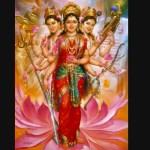 Following up on my previous post regarding the restriction on entry of women to the Sabarimala shrine in Kerala, I think I have to follow it up with its counterpart, the Attukal Pongala (mentioned in that article) where men are simply not allowed to participate.
Following up on my previous post regarding the restriction on entry of women to the Sabarimala shrine in Kerala, I think I have to follow it up with its counterpart, the Attukal Pongala (mentioned in that article) where men are simply not allowed to participate.
First, the Guinness record. Here is the link to the record. It states:
“The largest annual gathering of women is achieved by 2.5 million women in an event organised by ATTUKAL BHAGAVATHY TEMPLE TRUST in Kerala, India, on 10 March 2009. Attukal Pongala festival is a tradition of Hinduism.”[i]
This was in 2009. In the edition of the festival held in 2015, the number was supposedly around 4.0 million!
“I think nearly four million women have participated in the Pongala festival,” said a temple committee member.”[ii]
So, what is the festival about?
The festival is a 10 day long temple gathering which happens in the Attukal Pongala temple in Thiruvananthapuram, the capital of the small state of Kerala. The onset of the summer months in Kerala is a season for temple festivals. It happens in almost every temple in every town, district, and village in Kerala and is celebration time. Depending on the resources a temple has and the antiquity of the temple (which means the antiquity of the story attached to it), the festival it has runs from 3 to 10 days. So, the older and more established temples like the Attukal Devi temple has a festival that runs for 10 days.
Life becomes slower during these days as it is the time to indulge the senses. But the dharmic worldview of indulging the senses does not mean mindless pleasure seeking. Each day, the temple will have rituals and a percussion tableau (called as the melam) with lots of cultural programmes thrown in. Since the festival revolves around the temple deity, the pleasing of the senses is achieved with the carrying out of those activities like the melam, umpteen number of pujas, dance and music programs all infused with the sense of bhakti. Attukal Pongala is no different.
However, there is one difference with the Attukal temple festival. On the 9th day of the festival, there is a congregation of women who gather to cook a particular sweet porridge called pongal out in the open. This is made as an offering to the presiding deity of the temple, Attukal Bhagavathi or Devi, the mother goddess. It is this gathering of women that has earned its place in the Guinness book of records. The pongal is made in a clay pot on a fire which is lit between three bricks out in the open. The fuel for the fire is brought by the women from their homes and it is usually dried coconut rind and fronds.
The city starts filling up well before dawn and from last year’s (2015) accounts, streets in a 10km radius were cordoned off for the cooking ritual. The temple conducts the pujas to the Devi as three men seated in a hut recite the story of Kannagi’s life. Kannagi is believed to be a reincarnation of the Devi. The story that is recited at the temple for Pongala can be read from links below. However, there is a point in the story where Kannagi destroys the city of Madurai with fire. This point in the story is the cue for the temple priest to light the holy fire in the temple. The cooking then commences with the fire that is lit from this first one, the fire being passed down to the women one by one from the original one.
The women wait in the gathering smoke and heat until their pot boils over with its contents.
Pongal is made of rice, jaggery cooked in water and garnished with coconut. The cooked dish is then served around all the assembled people as prasadam blessed by the Devi. While cooking, the women ask the Devi for blessings for whatever it is that is on the top of their list of priorities for the year. During this entire episode, menfolk are not allowed anywhere in the vicinity unless they happen to be the temple administration officials or someone connected with the actual conduct of the rituals. Permission is needed if a man wants to enter the area and men generally keep away without complaint.
At the end of the day, the women gather all their belongings and leave the place. And last year, it is said that the women cleared up every single thing after they finished so that they left the place clean and tidy. This was a gesture in support of the Swacch Bharat campaign launched by the present Government of Bharata desam.
At this festival of the women, by the women and for the women, there are no caste barriers, no class barriers and in recent years, no religion barriers either. It is however a Hindu festival in its nature, its origin and its ethos.
Excerpts from a Foreigner’s Account of the Pongala
At the outset I must say that I usually view any foreigner’s account of our traditions with suspicion because they do not understand our culture like we do. Hence I do not like to quote such studies.
However, during my research on the festival I came across a paper/article written by a foreigner on this festival which had so many points that I would like to reproduce here. The writer of this article/paper does have many misconceptions which I do not want to elaborate on here. However, she makes some beautiful points in her paper which I would like Bharatiya women to read carefully and understand before embarking on their ‘Happy to bleed’ and confrontationist path with men.
With regard to Kerala, it must be stated that Kerala had a matrilineal system from ancient times. It is in this context that I reproduce the writer’s words [Emphasis mine].
“There were several positive consequences for the status of women and children in the system. The mother was the most significant parent in every respect, and women were indispensable for the continuation of the matrilineage, which was understood to be an indivisible combination of the people, land, and ancestors. There was no prepuberty marriage, and the marriage ritual was simple, with no transfer of wealth or power as in a dowry system. Because women did not leave their homes, they and their children had no loss of power or status. Legitimacy, which was the main concern in the rest of India, was relatively unimportant. Females had high visibility, indeed were indispensable. The trauma of widowhood was avoided (Gulati, Ramalingam, and Gulati 1996, 4). A female, from the moment of her birth, was “perceived as the (potential) purveyor of prosperity, fertility, and good fortune. The female is an auspicious category” (de Tourreil 1995, 17).”
The below extract is true for all Hindu families, not especially Kerala ones, as far as I know. However, it is important to highlight it since it is a luxury the West does not have. And we never appreciate it fully enough ourselves.
“Shakunthala’s daughter, Gigi, married at twenty-two, later than women in other parts of India, and returned home to her mother when she was five months pregnant with her first child. When I told her that this would be unusual in the United States, she was very concerned: “Who will give the girl and baby the massages?” In their ayurvedic system, birth is an event that holds great possibility for healing and also for poor health. They believe that with proper care, any existing condition can be cured. Before birth and for forty-one days following, the women of the family provide the mother and baby special massages and diet. Wealth as well as healing and natal care continues in the matrilineal line.”
On the inclusive nature of the festivities:
“ On Pongala day, not only every street but every courtyard is filled with women. It is auspicious to live near the temple because Pongala brings prosperity. In return for this advantage, each family, including Christian and Moslem ones, invites women to cook Pongala in their courtyard. It is a blessing to be able to receive the women in the name of the Goddess Bhagavati and good luck for the occupants of the house. Every courtesy is extended to the women–both those who have been invited and those who just show up.”
On what it means for this lady to be at this festival and how it is significant for her society, the Western one.
“The journalist continues, “The way it is generally perceived here is that in the West you don’t value your family. Given that background, does Pongala seem relevant? Because here too, we are changing.
I answer, trying to be truthful and trying to make a bridge:
Yes, we care about our families and what is happening to them. I think that is why women in the United States are looking at spiritual traditions and practices. Some women are looking into their own traditions, but some of us are looking to older religions, religions that have the concept of a deity as a mother. We don’t have that concept in the West; we don’t have the concept of the Divine Feminine. Many women in the West are trying to find rituals and ways to help reconstruct and revision our families and our society.
… You still massage your babies and pregnant mothers, and we have forgotten that need. You still go to the snake groves to ask for children and are content if you only have two and both are girls. Christians, Moslems, and Hindus from all communities come together to do Pongala for the Goddess, united in their wishes for healthy and happy families. When I have shown films of Pongala to women in the West, they are inspired.”
… “Because here, too, we are changing”; the words of the reporter repeat in my mind. I am profoundly disturbed by the changes because they remind me of what I believe we have lost in the West and the consequences of that loss. As Hema says, “We are trying to change like you at the same time you are trying to find out about us.”
On the unselfish nature of the wishes that the devotees ask of their Devi while doing the Pongala as also the spirit of sharing that this festival is infused with.
“As a researcher, I have been asking women what they ask Bhagavati for. Many respond, “I asked for the health and well-being of my family.” The vegetable seller asks that her family never goes hungry. Asha asks for a job. Shreemadi asks that her granddaughter do well on her school tests. Tara asked for a good husband.
…When you go to the Pongala you try to share everything there. There is nothing that belongs to you exclusively. So you don’t try to exclusively appropriate something that belongs to you and not share it with another person. If you did, then you would be immediately given a sign of it before you reach home.” “What kind of sign?” I asked. “Some small disaster that you wouldn’t forget. People don’t cheat. They don’t steal. If they would take something, then double that would be taken away. The women stay there without quarreling until they reach home.”
And finally, a gesture from our menfolk that is at once simple and celebratory and at the same time reinforces my idea that most of our men still consider the feminine as divine.
“The men begin to come back. When the helicopters do not arrive to shower the departing women with flowers, the men take buckets of petals and, standing on top of the walls, do it themselves. I am astonished. This is why I come here.”
As a woman, this simple and uncomplicated celebration of womanhood is exhilarating. Which woman does not want to be showered with petals! Unrelated men just celebrating the earth that you are trodding on because you are considered divine…I can’t imagine a woman not being moved by that gesture.
The full paper can be found here.
Conclusion

I have only this to conclude with. To my women counterparts I say, let us not demonize our men so much that they eventually start being the demonic beings from the foreign/media projections that are made on them. Understand the evolution of our society. It is different from the trajectory of the West. Appreciate that difference and by all means change and evolve. But do it with a civilizational lens that is compatible with ours. Don’t use the lens of the West to analyze, dissect and deconstruct our culture. It is only bound to fail.
To the men: I have to say, we are proud to be complementary beings to you. You have a culture of looking upon us as the divine. Do not lose that reverence in the noise that is generated today. It is the one thing that has kept the women of Bharata desam safer than their counterparts elsewhere in the world. At the same time, in keeping with the changed times, do your best to encourage the woman to achieve her potential in whatever it is that she may choose to do. Be the supporter, the care giver, the baby sitter when the need arises. It will only make the relationship more harmonious.
Post Script: For those whose curiosity is piqued, the festival calendar for Attukal Pongala this year is between 15 Feb and 24 Feb. The Pongala itself therefore falls on 23 Jan. Do join and celebrate the divine woman.
References:
[i] http://www.guinnessworldrecords.com/world-records/largest-annual-gathering-of-women/
[ii] http://www.dailypioneer.com/nation/millions-of-women-offer-pongala.html
[iii]http://www.cnanthropology.com/article-475-1.html
[iv] http://www.attukaldevi.com/pl/attukal-devi-history.htm
[v] http://www.attukaldevi.com/pl/story-kannagi.htm
[vi] http://attukalpongala.blogspot.in/
Disclaimer: This article represents the opinions of the Author, and should not be considered a reflection of the views of the Indic Civilizational Portal. The Author is responsible for ensuring the factual veracity of the content, herein.




Another great post, Nilambari! Excellent facts too. So many great traditions that bring out the beauty in both genders and different ways of life. Thanks!